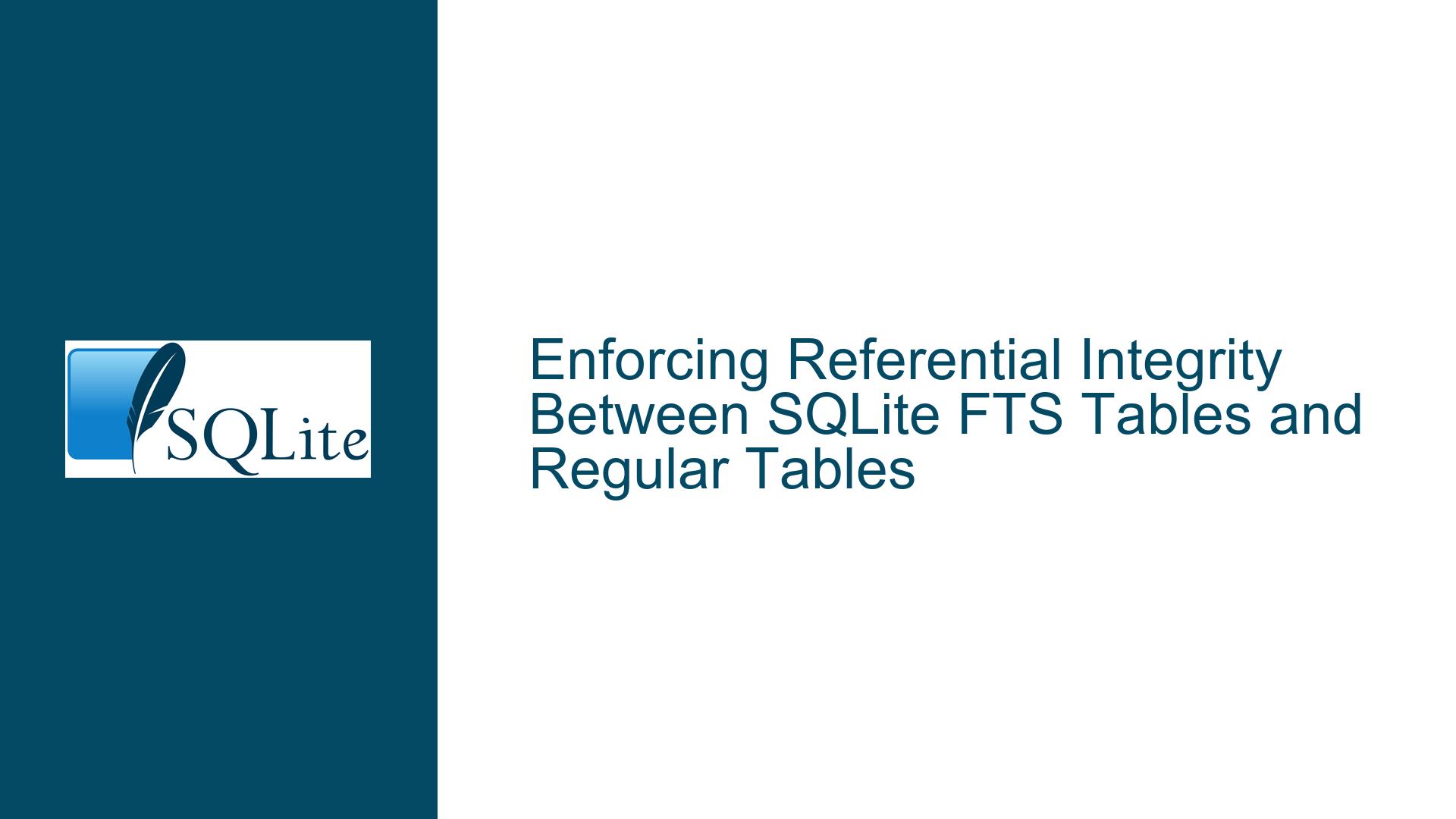Enforcing Referential Integrity Between SQLite FTS Tables and Regular Tables
Understanding the Limitations of Virtual Tables and Foreign Keys in SQLite
The core issue revolves around the inability to enforce referential integrity between a virtual Full-Text Search (FTS) table and a regular table in SQLite using foreign keys. This limitation stems from the nature of virtual tables in SQLite, which are designed to provide specialized functionality like full-text search but do not support the same constraints and features as regular tables. Specifically, virtual tables, including FTS tables, do not support foreign key constraints, which are crucial for maintaining referential integrity between related tables.
When attempting to create a foreign key relationship between a regular table (users) and a virtual FTS table (usersFTS), SQLite throws a "foreign key mismatch" error. This error occurs because the virtual table does not support the necessary mechanisms to enforce foreign key constraints. The FTS table, being virtual, does not have a traditional rowid that can be referenced in a foreign key relationship, even though it has an implicit rowid column.
The problem is further compounded by the fact that FTS tables do not support data types, constraints, or primary key declarations. This means that while you can insert data into an FTS table and use its rowid for joins, you cannot enforce that the rowid values in the FTS table correspond to valid primary key values in a related regular table. This lack of enforcement can lead to data integrity issues, such as orphaned rows in the FTS table that do not correspond to any rows in the regular table.
Exploring the Root Causes of Referential Integrity Issues with FTS Tables
The root cause of the referential integrity issue lies in the architectural design of SQLite’s virtual tables, particularly FTS tables. Virtual tables in SQLite are implemented as modules that provide custom behavior, and they do not adhere to the same rules as regular tables. This design allows for flexibility and specialized functionality, such as full-text search, but it also imposes limitations on how virtual tables can interact with regular tables.
One of the key limitations is that virtual tables do not support foreign key constraints. Foreign keys are a fundamental feature of relational databases that ensure the integrity of relationships between tables by enforcing that a value in one table must exist in another table. In the case of FTS tables, the lack of foreign key support means that there is no built-in mechanism to ensure that the rowid values in the FTS table correspond to valid primary key values in a related regular table.
Another contributing factor is the absence of data type enforcement in FTS tables. Unlike regular tables, FTS tables do not allow you to specify data types for columns, which means that all data is treated as text. This lack of data type enforcement can lead to inconsistencies and potential issues when joining FTS tables with regular tables that have strict data type requirements.
Additionally, the implicit rowid column in FTS tables, while useful for joins, does not provide the same guarantees as a primary key in a regular table. The rowid is automatically generated and can be manually overridden, which means that it is possible to insert rows into the FTS table with rowid values that do not correspond to any rows in the related regular table. This can result in orphaned rows and broken relationships, undermining the integrity of the database.
Implementing Workarounds and Best Practices for Maintaining Data Integrity
While SQLite does not natively support foreign key constraints between FTS tables and regular tables, there are several workarounds and best practices that can be employed to maintain data integrity and achieve the desired functionality.
One approach is to manually manage the relationship between the regular table and the FTS table by ensuring that the rowid values in the FTS table correspond to valid primary key values in the regular table. This can be done by explicitly inserting the primary key value from the regular table into the rowid column of the FTS table. For example:
CREATE TABLE users(
id INTEGER PRIMARY KEY AUTOINCREMENT,
name TEXT NOT NULL,
email TEXT NOT NULL UNIQUE
);
CREATE VIRTUAL TABLE usersFTS USING fts4(
keywords,
nicknames
);
-- Insert into users and capture the generated rowid
INSERT INTO users (name, email) VALUES ('Alice', '[email protected]');
SELECT last_insert_rowid(); -- Assume it returns 1
-- Insert into usersFTS using the captured rowid
INSERT INTO usersFTS (rowid, keywords, nicknames) VALUES (1, 'software developer linux open-source', 'Ally Alice');
-- Query to join users and usersFTS
SELECT users.id, users.name, users.email, usersFTS.keywords, usersFTS.nicknames
FROM users
JOIN usersFTS ON users.id = usersFTS.rowid
WHERE usersFTS.keywords MATCH '"software developer"';
In this approach, the rowid in the FTS table is explicitly set to the primary key value from the regular table, ensuring that the relationship is maintained. However, this method requires careful management to avoid orphaned rows and broken relationships.
Another approach is to use triggers to automatically maintain the relationship between the regular table and the FTS table. For example, you can create an AFTER INSERT trigger on the regular table that automatically inserts the corresponding row into the FTS table:
CREATE TRIGGER insert_usersFTS AFTER INSERT ON users
BEGIN
INSERT INTO usersFTS (rowid, keywords, nicknames)
VALUES (NEW.id, 'default_keywords', 'default_nicknames');
END;
This trigger ensures that whenever a new row is inserted into the users table, a corresponding row is also inserted into the usersFTS table with the same rowid. This approach helps to maintain data integrity by automating the relationship management process.
For more advanced use cases, consider using FTS5 with external content tables. FTS5 introduces the concept of external content tables, which allow you to store the actual content in a regular table and use the FTS table as an index. This approach can help to maintain data integrity by keeping the content in a regular table that supports foreign key constraints, while still providing full-text search capabilities through the FTS table.
To use FTS5 with external content tables, you would first create the regular table and the FTS table with the content option pointing to the regular table:
CREATE TABLE users(
id INTEGER PRIMARY KEY AUTOINCREMENT,
name TEXT NOT NULL,
email TEXT NOT NULL UNIQUE,
keywords TEXT,
nicknames TEXT
);
CREATE VIRTUAL TABLE usersFTS USING fts5(
keywords,
nicknames,
content='users',
content_rowid='id'
);
In this setup, the usersFTS table acts as an index for the users table, and the content is stored in the users table. This approach allows you to maintain referential integrity in the users table while still benefiting from full-text search capabilities.
In conclusion, while SQLite’s FTS tables do not natively support foreign key constraints, there are several workarounds and best practices that can be employed to maintain data integrity and achieve the desired functionality. By carefully managing the relationship between regular tables and FTS tables, using triggers, or leveraging FTS5 with external content tables, you can ensure that your database remains consistent and reliable.






